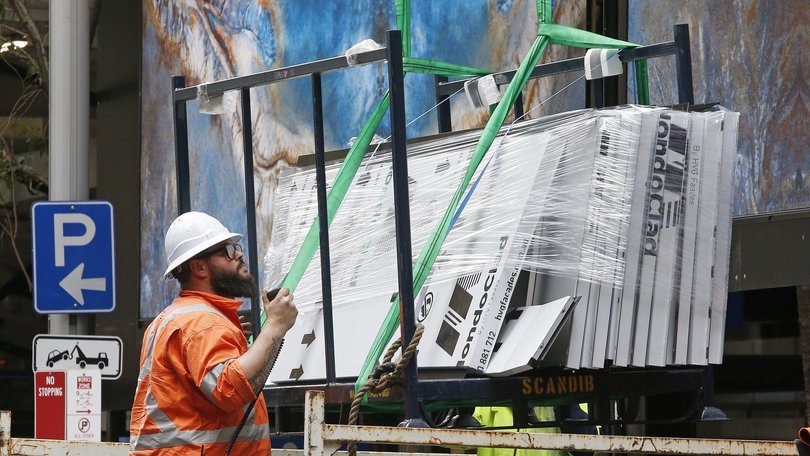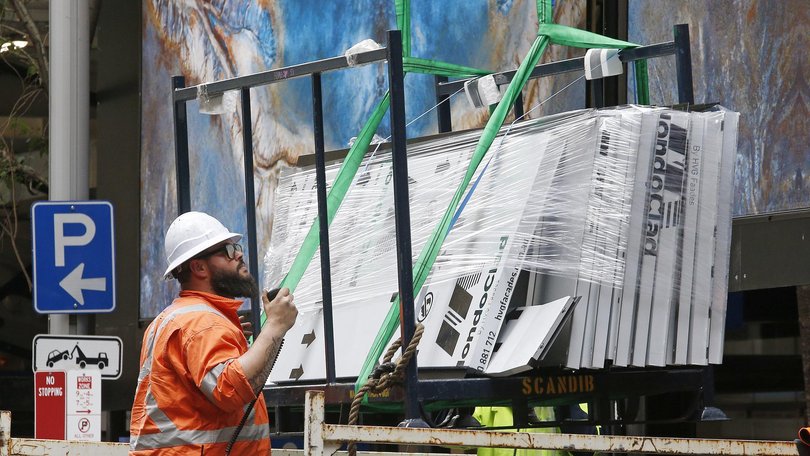Living standards to fall as RBA warns on growth
Australia’s economy faces a stark reality check, as productivity growth has halved in two decades, leading to an unprecedented decline in living standards.

Australians’ living standards will fall and there’s very little the central bank can do about it.
According to the Reserve Bank’s statement on monetary policy, there will be lower pay rises, weak consumer spending, falling business profits and an overall drop in living standards over the medium term.
The central bank put the issue squarely on Australia’s lack of productivity and points out it is powerless to stop it.
Sign up to The Nightly's newsletters.
Get the first look at the digital newspaper, curated daily stories and breaking headlines delivered to your inbox.
By continuing you agree to our Terms and Privacy Policy.“Lower productivity growth means slower growth in business revenues, household incomes and ultimately demand,” the RBA’s quarterly statement on monetary policy said.
Despite the grim outlook, the RBA boss Michele Bullock was quick to point out there was little the central bank could do to fix these issues, even as she announced last Tuesday that the board was cutting interest rates by 25 basis points to 3.60 per cent.

“(The) productivity slowdown is a matter for the government that they are taking on,” Ms Bullock said.
“They’re looking at what they can do.”
Ms Bullock said businesses were also looking at the issue.
“There’s nothing the Reserve Bank can do,” she continued.
“All the Reserve Bank can do is make sure we have low and stable inflation, and if we have full employment, both of those things are very stable environments for businesses to think about how they might improve productivity, how they might produce more for the same amount of labour and capital input.”
The RBA’s call comes just days ahead of Treasurer Jim Chalmers’ much-hyped economic roundtable
Economists, unions, business people and politicians will all head to Canberra next week for a three-day discussion aimed at lifting Australia’s falling productivity.
Why does it matter?
Simply put, productivity matters because it improves living standards, leads to economic growth and a greater economy.
Productivity is the measure of how efficiently resources such as time, effort and materials are used to produce a given output.
According to the Australian Bureau of Statistics, Australia’s long-term productivity has slumped.
In 2003-2004, productivity grew at 1.8 per cent a year; in 2022-2023, it was down to just 0.9 per cent a year.

Under this grim reality, Australians’ living standards are falling.
To put a dollar figure on it, the Productivity Commission estimated that full-time workers would be $14,000 a year worse off by 2035 if Australia couldn’t rediscover its previous growth and continued on its current trend.
Separate RBA research found the slump in productivity came at the same time as a lack of competition in business, costing every Aussie about $3000 in today’s dollars.
Australians remain in the dark
Despite having a wide-ranging impact on their lives, most Australians are unaware of what the government is doing or trying to achieve with its productivity roundtable.
According to Amplify and YouGov polling, three in four Aussies haven’t heard of the roundtable and a further 60 per cent are not confident it would lead to meaningful change.
Amplify chief executive Georgina Harrisson said this issue hits every Australian household, but too often governments propose solutions that pit different parts of the community against each other.
“This roundtable can’t just be a talkfest limited to the Canberra bubble – not when the issue is
being felt in every Australian home,” she said.
“Australians are doing it tough, with rising bills, higher housing costs and lower productivity.
NED-9175-Australia’s GDP
“The government can’t afford to waste this moment on words alone; we need action that delivers real wins in people’s pockets.”
Ms Harrisson said the government needed to do far more to bring the voices of everyday
Australians into the discussion.
“When the community don’t trust or feel understood by their political representatives, it is more important than ever to be reaching out and letting them in to the conversations that affect them most,” she said.

Four things to lift productivity
Meanwhile, AMP chief economist Shane Oliver says there are four key ways the government can lift productivity.
He believes too much regulation, the current tax system, a lack of competition and government overspending is all holding Australia back.
Dr Oliver said productivity is the “secret sauce” that enables strong growth in real wages, living standards and profits while, at the same time, keeping inflation low.
“So hopefully, the Roundtable will kick off a process of economic reform that will boost the ability of the economy to produce goods and services with the aim of boosting long-term living standards,” he said.
Dr Oliver said the government should lift productivity through removing red tape, tax reform, increasing competition and having government spending capped at 25 per cent of GDP. It is currently 28 per cent.
“Combined it should free up the supply side of the economy to make it easier for the economy to supply goods and services for any given level of hours worked by Australian workers,” he told NewsWire.
“For example, it should enable us to build more homes and allow businesses to produce more.”
As part of the roundtable, the economist said there needs to be a rebalance away from income taxes to a broader GST, while compensating those on a lower income, and removing nuisance taxes like stamp duty, would be key to getting Australia’s productivity back on track.

“This sounds politically difficult but if combined with an adjustment to income tax scales to offset the regressive nature of the GST, some measures to cap property tax concessions (like cutting the overly generous capital gains tax discount) and better tax gas exports a broad consensus could be reached,” he said.
Dr Oliver also proposed keeping government spending below 25 per cent of GDP as it would ensure budget stability and boost productivity by not having the government taking more than required when it comes to workers.
“The reality of course is that everyone has their wish list and expectations running into the Roundtable appear to be running too high. It’s likely just the start of long process through which (hopefully) the government will pick the best options and make some compromises,” he said.
NAB chief executive Andrew Irvine said stronger business investment and less regulation was required to help lift Australia’s ailing productivity.
“The vast amount of job growth in our country in the last 10 years has been in the public sector, not the private sector,” he said at the Australian Banking Association annual conference in Sydney.
“When I speak to our business customers, they say it’s just too hard to start, scale and grow a business. We need to fix that and reduce red tape to create more jobs in the private sector.”
Originally published as Living standards to fall as RBA warns on growth
